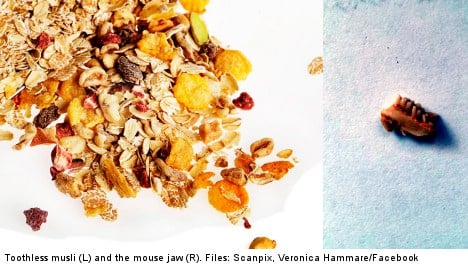“Hi Ica! This morning I found teeth in your own brand Ica organic muesli,” Veronica Hammare, 22, wrote on the company’s Facebook page. “To find teeth in your muesli is more than revolting, especially as I didn’t just find them in the muesli but in my mouth!”
Yet the large-scale retailers responded to her complaint in a manner which Stockholmer Hammare found far too lukewarm.
“When I called your customer service they told me I’d be compensated for the muesli,” she continued. “So I’ll get as much as 20 kronor because I bought your product and ended up with animal teeth in my mouth?”
The Metro newspaper on Thursday rounded up recent cases of Swedes finding unintended contents in their food.
A family in Karlskrona found a nail in a packet of chicken sausages from Coop’s own range. Last year, in Norrköping, a woman found a dead frog in a packet of salad. Three years ago, a man in Lidingö found a dead mouse in his “Italian mix” salad from the Willys supermarket.
Hammare, meanwhile, said she did not accept that Ica would only offer her money back for the actual muesli.
“I do not accept that compensation. SO GOD DAMN GROSS, ICA!” the 22-year-old wrote on Facebook, finishing off her rant by encouraging her friends on Facebook to share and spread her complaint.
Ica has now said that Hammare will get additional compensation, but did not specify how much.
“This absolutely should not have to happen. We are always really happy when customers get in touch with us to tell us when this kind of thing occurs,” Ica spokeswoman Sara Hjelm told Metro.
TT/The Local/at



 Please whitelist us to continue reading.
Please whitelist us to continue reading.
Member comments